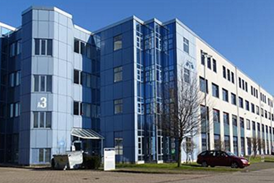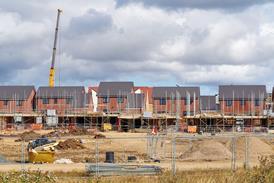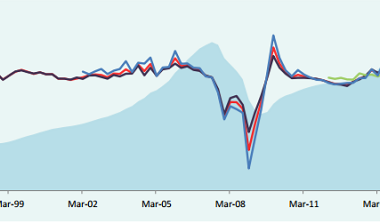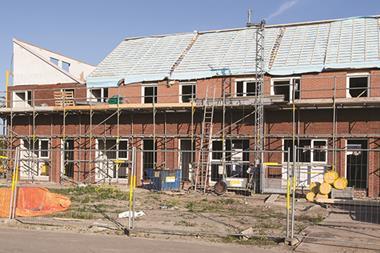“Perhaps the surprise of 2017 will be the outperformance of the UK-quoted real estate sector against the wider equity markets” was the closing sentence in my January column.

While comparisons to Nostradamus could be a little premature, my crystal ball gazing for UK-quoted real estate performance has so far proved reasonably accurate.
Unlike 2016, when only one company with a market cap over £100m beat the FTSE All Share, in the first half of 2017 there were 32 quoted real estate companies that outperformed the FTSE All-Share, the FTSE 100 and the FTSE 350 - most definitely a bounce-back.
Despite our politicians’ best attempts to create sustained uncertainty and volatility in the UK, it appears investors have ignored all that and backed companies with a clear, focused and specialist strategy.
For example, St Modwen’s recent strategy review and ongoing programme of non-core disposals have been well received by the market and it now sits fourth in the league table, up from 47th position in January 2017.
The companies that generally outperformed either benefited from the narrowing of their discount to net asset value or are sector focused with a commitment to delivering a high and growing dividend yield.
Subsector success
Companies operating in subsectors such as self-storage, student accommodation, residential, logistics and healthcare real estate have all performed well over the past six months.
In the retail sector, three of the four sector specialists delivered positive total shareholder returns, led by my own company NewRiver REIT. We comfortably outperformed the FTSE All-Share notwithstanding the fact that we are one of only a few companies that consistently trades at a premium to our net asset value (around 16%) and still deliver one of the highest dividend yields in our sector (6%).
Only six firms delivered a negative total shareholder return, with all of them owning large portfolios of London offices. The equity markets are clearly negative about the medium-term prospects of London offices despite the phenomenal sale of the Cheesegrater by British Land, which achieved a 24% premium to book value.
Investor confidence in the quoted real estate sector is evidenced by the increase in capital market activity. In the first six months of 2017, six real estate companies, all sector specialists, raised £1.5bn of fresh equity. If you include IPOs (LXI, Impact Healthcare, PRS REIT and AEW UK Long Lease) that figure rises to £2bn compared with £1.1bn over the same period in 2016.
Listed real estate companies ranked by total shareholder return for H1 2017 (REITs in blue)
| Company | TSR | Approx. market cap (£m) | |
|---|---|---|---|
| 1 | CLS Holdings | 35.8 | 827 |
| 2 | McKay Securities | 35 | 214.7 |
| 3 | Safestore | 23 | 882 |
| 4 | St Modwen | 19.5 | 796.3 |
| 5 | Kennedy Wilson Europe | 18.6 | 1,400.10 |
| 6 | Big Yellow | 17.6 | 1,250.80 |
| 7 | Conygar | 14.8 | 123.3 |
| 8 | Schroder | 14.6 | 331.8 |
| 9 | SEGRO | 14.5 | 4,884.70 |
| 10 | Assura | 14.2 | 1,161.50 |
| 11 | Workspace | 13.4 | 1,453.30 |
| 12 | Hansteen Holdings | 12.9 | 926.7 |
| 13 | U+I | 12.6 | 236.1 |
| 14 | Picton | 12.2 | |
| 15 | Secure | 11.8 | 797.1 |
| 16 | UK Comm Trust | 11.4 | |
| 17 | AEW UK | 11.4 | 126.7 |
| 18 | Grainger | 11.3 | 1,096.60 |
| 19 | A&J Mucklow | 10.8 | 319.6 |
| 20 | F&C UK Investments | 10.4 | 257 |
| 21 | LondonMetric | 10.3 | 1,160.00 |
| 22 | Custodian | 10.2 | 405.4 |
| 23 | Unite Students | 9.1 | 1,562.40 |
| 24 | F&C Commercial Trust | 8.8 | |
| 25 | Shaftesbury | 8.8 | 2,713.30 |
| 26 | Empiric Student Property | 8.4 | 560.2 |
| 27 | Tritax Big Box | 7.8 | 1,992.80 |
| 28 | NewRiver | 7.2 | 821.9 |
| 29 | Target Health | 7.2 | 296.9 |
| 30 | Standard Life Investment Property | 6 | 347 |
| 31 | Town Centre Securities | 5.9 | 154.2 |
| 32 | Mountview Estates | 5.8 | 448.4 |
| 33 | FTSE All Share | 5.5 | |
| 34 | FTSE 350 | 5.3 | |
| 35 | Capital & Regional | 5.3 | 398.5 |
| 36 | Redefine International | 5.1 | 728.1 |
| 37 | Primary Health | 4.7 | 681.3 |
| 38 | FTSE 100 | 4.7 | |
| 39 | Helical | 4.1 | 356.5 |
| 40 | FTSE 350 RE | 3.3 | |
| 41 | Hammerson | 2.7 | 4,557.00 |
| 42 | MedicX | 2.2 | |
| 43 | Regional | 1.6 | 316.3 |
| 44 | Daejan Holdings | 0.3 | 1,006.20 |
| 45 | British Land | -0.3 | 6,235.80 |
| 46 | Intu | -1.1 | 3,646.40 |
| 47 | Capital & Cos | -1.2 | 2,483.50 |
| 48 | Derwent London | -1.2 | 2,957.90 |
| 49 | Landsec | -3.1 | 8,010.30 |
| 50 | Great Portland Estates | -10 | 1,950.60 |
Where no market cap is supplied for non-index entries, no information was available. Source: Bloomberg
Interesting trends
Furthermore, there are some interesting trends emerging in the quoted real estate sector. Firstly, there is the growth of the mid-/small-cap real estate companies. Research by Chris Spearing of Canaccord Genuity reveals that in April 2009, mid-/small-cap companies represented 25% of the real estate index, whereas in May 2017 they represented 51% of the index. This trend, reflecting the importance of sector focus and specialisation, is likely to continue with Supermarket Income REIT the latest company to announce its intention to float.
Secondly, a number of companies have returned capital to shareholders, principally through the announcement of special dividends. These events are often linked to the crystallisation of value created by firms, such as asset disposals or significant leasing deals, and are another illustration of the importance of income returns to shareholders in the absence of capital growth.
Internationally, the eurozone-quoted real estate companies on average delivered the highest performances, possibly reflecting the increased confidence in EU political stability. By contrast, the US-quoted real estate companies delivered on average a negative total shareholder return.
Looking ahead to the second half of the year for UK-quoted real estate companies, the key in this environment of political and economic uncertainty continues to be sector specialisation and a focus on growing cash earnings, because ultimately that is what will drive share prices.
In this column, I repeatedly extol a focus on specialisation and cash earnings and I may sound like a broken record - but it’s always the best tracks that get the room dancing!






























No comments yet